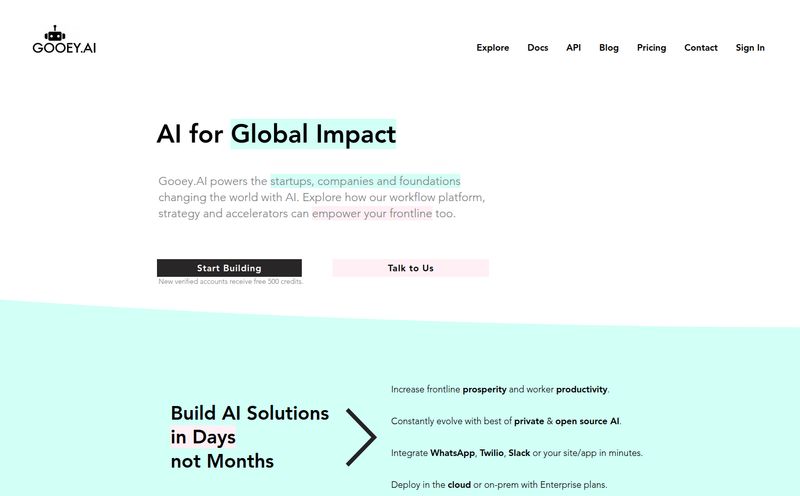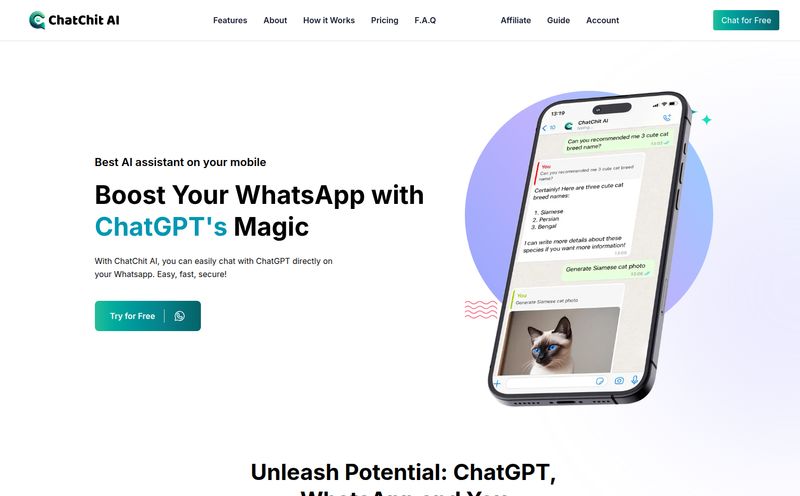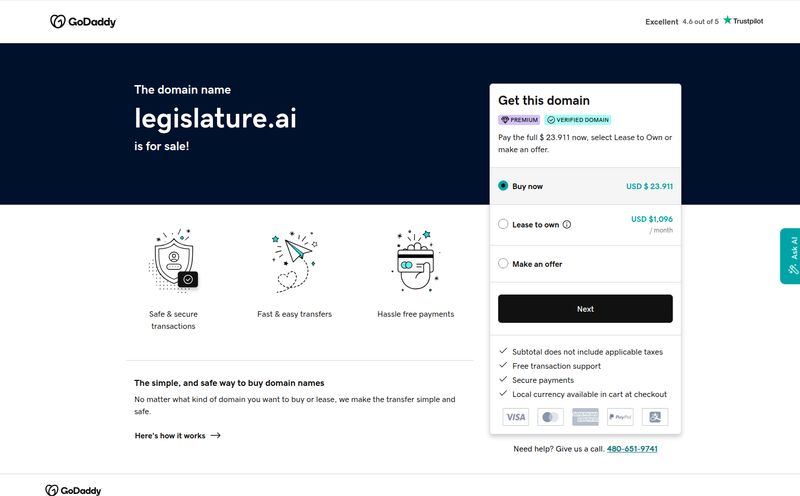We're all supposed to be “data-driven” these days. It’s the mantra chanted in every marketing meeting, the golden rule of every growth hacker’s playbook. But for most of us, being data-driven feels less like steering a speedboat and more like trying to drink from a firehose. You’re buried in spreadsheets, wrestling with clunky BI platforms that require a PhD to operate, and you still can't get a straight answer to a simple question. Sound familiar?
I’ve been in that trench for years. Juggling a half-dozen subscriptions for analytics, reporting, and market trends, and still feeling like I was just guessing. So when I stumbled upon a platform called Dxyfer, my professional curiosity was definitely piqued. It promised AI-powered analysis without the complexity, a way to just... ask your data questions. In plain English. A bold claim, I thought. But after kicking the tires, I think they might actually be onto something big.
So, What is Dxyfer, Really?
At its heart, Dxyfer (pronounced like 'decipher', which is clever) is an Augmented Intelligence platform. And no, that’s not just another buzzword. It’s a key distinction. It’s not about some scary AI robot coming to take your job; it's about giving you, the human, a ridiculously smart assistant. Think of it as Iron Man’s J.A.R.V.I.S., but for your business data.

Visit Dxyfer
It’s a SaaS tool designed to connect to your data sources—spreadsheets, databases, you name it—and let you interact with them conversationally. Instead of writing complex queries or begging your one tech-savvy colleague for a custom report, you just ask. It’s built on some serious tech, with partners like AWS and MongoDB, but the whole point is that you never have to see the messy wiring. You just get the answers.
The Three Musketeers of Dxyfer's Features
Dxyfer's magic really comes down to three core functions. Each one tackles a different, but equally massive, business headache.
AskData: Your Personal Data Oracle
This is the main event. You connect a data source, and then you can literally ask it questions like, “What were our top 5 selling products in the UK last quarter?” or “Show me the customer churn rate month-over-month.” Dxyfer goes in, crunches the numbers, and comes back not just with a number, but with a visualization and an explanation. It even references where it got the data, so you can trust the answers. For anyone who’s spent an afternoon fighting with pivot tables to get a single stat, this feels like a genuine miracle.
AskDocs: Taming the Document Jungle
Okay, this is the feature that really got me excited. We all have that one shared drive. The one filled with hundreds of PDFs, Word docs, quarterly reports, and legal contracts. Finding a specific piece of information in there is a nightmare. AskDocs lets you dump all those documents into the system and then query them all at once. Imagine asking, “What were the key takeaways from all Q3 board meetings?” or “Find all contracts that mention a 'force majeure' clause.” The time-saving potential here is just staggering. It turns your chaotic document library into a searchable brain.
AutoDash: Dashboards That Actually Make Sense
I have a love-hate thing with dashboards. They look impressive, but they're often static and don't tell you why something is happening. Dxyfer's AutoDash aims to fix this. It helps you create dynamic, interactive dashboards to monitor your most important KPIs. Because it's powered by the same conversational AI, the dashboards feel more alive. You can drill down into the data and explore trends right from the chart, making it more of an investigative tool than a simple wall-chart.
Let's Talk Money: The Dxyfer Pricing Breakdown
Alright, so how much does this data magic cost? This is often where cool new tools fall apart, but Dxyfer’s pricing is surprisingly grounded. They’ve got a tiered system that makes sense for different types of users.
| Plan | Price | Best For |
|---|---|---|
| Starter | Free | Individuals or personal use. A great way to test the waters. |
| Pro | $39/month (billed annually) or $59/month | Professionals, freelancers, and power users who need more juice. |
| Business | $34/user/month (billed annually) or $52/user/month | Teams who need to collaborate on data. Note the 5-user minimum here. |
| Enterprise | Custom Pricing (Let's Talk) | Large organizations with specific security, support, or customization needs. |
The free Starter plan is huge. It’s not a crippled trial; it gives you a real feel for the platform. For professionals, the Pro plan at $39/month (if you pay for the year) is pretty competitive when you consider it could replace a couple of other tools you're already paying for. That's less than a few fancy coffees a week.
The Good, The Not-So-Bad, and The AI-Powered
No tool is perfect, right? Here’s my honest take on where Dxyfer shines and where there's room to grow.
What I really like is the immediate ROI. You can practically feel the hours of manual work melting away. It consolidates tasks that might currently require a data analyst, a BI tool subscription, and a document search tool into one platform. That’s a direct saving in both time and money. The visualizations are clean, intuitive, and the fact that it shows its work by referencing the data source is a big trust signal for me.
On the other hand, a few things to keep in mind. Some of the more advanced add-ons are still listed as “Coming Soon.” That’s not a deal-breaker, as the core product is solid, but it’s something to be aware of. Also, the Business plan’s 5-user minimum might be a slight hurdle for smaller teams of, say, 2 or 3 people. They might have to stick with individual Pro accounts for a bit. But these are pretty minor gripes in the grand scheme of things.
Real-World Proof from Down Under
It's one thing for me to say it's cool, but it's another to see it working for a major brand. I saw a testimonial on their site from MasterFoods Australia, which is part of the massive Mars corporation. They mentioned Dxyfer has “re-invented the way we connect with data” and praised its natural language search. When a company of that scale is getting real value out of a platform, it tells you this isn't just a toy for startups. It’s a serious business tool.
Frequently Asked Questions
- Do I need to be a data scientist to use Dxyfer?
- Absolutely not. That’s the whole point! If you can type a question into Google, you can use Dxyfer. It’s designed for business users, marketers, and managers, not just tech wizards.
- Is my data secure with Dxyfer?
- This is a big one. They seem to take it seriously, mentioning top-tier security measures. Since they partner with providers like AWS, they benefit from a very robust and secure infrastructure. As always, do your own due diligence, but it appears to be a priority for them.
- Can Dxyfer connect to my existing systems like an ERP?
- The documentation suggests it has a wide range of integration capabilities. For complex or proprietary systems like an ERP, you'd likely want to talk to their sales team for the Business or Enterprise plan to ensure a smooth connection.
- What kind of data sources can I connect?
- It's designed to be flexible. You can connect things like SQL databases, CSV files, Excel spreadsheets, and more. The goal is to bring all your scattered data under one roof.
- Is the free plan actually useful?
- From what I've seen, yes. It's generous enough to let you upload a dataset and properly test out the AskData and dashboard features. It’s the best way to see if the workflow clicks for you before spending a dime.
My Final Verdict: Is Dxyfer Worth Your Time?
In a world overflowing with complex, over-engineered “solutions,” Dxyfer feels like a breath of fresh air. It’s built on a simple, powerful idea: let people talk to their data.
If you're a solo entrepreneur, a marketing manager, or part of a team that feels constantly bottlenecked by data requests, I think you owe it to yourself to try the free plan. It democratizes data analysis in a way I haven’t seen many other tools achieve. It's not about giving you more charts and graphs; it’s about giving you answers. And at the end of the day, that’s what we’ve all been looking for.



